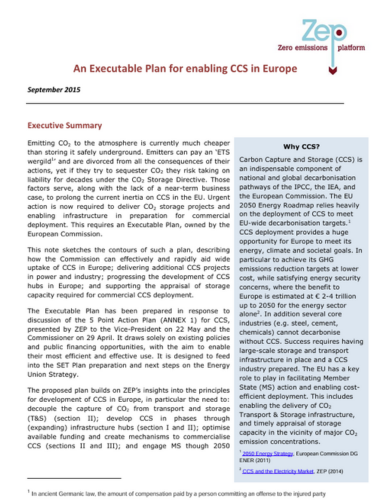An executable plan for enabling CCS in Europe
Executive summary
Emitting CO2 to the atmosphere is currently much cheaper than storing it safely underground. Emitters can pay an ‘ETS wergild’ and are divorced from all the consequences of their actions, yet if they try to sequester CO2, they risk taking on liability for decades under the CO2 Storage Directive. Those factors serve, along with the lack of a near-term business case, to prolong the current inertia on CCS in the EU. Urgent action is now required to deliver CO2 storage projects and enable infrastructure in preparation for commercial deployment. This requires an Executable Plan, owned by the European Commission.
This note sketches the contours of such a plan, describing how the Commission can effectively and rapidly aid the wide uptake of CCS in Europe; deliver additional CCS projects in power and industry; progress the development of CCS hubs in Europe; and support the appraisal of storage capacity required for commercial CCS deployment.
The Executable Plan has been prepared in response to the discussion of the 5 Point Action Plan (ANNEX 1) for CCS, presented by ZEP to the Vice-President on 22 May and the Commissioner on 29 April. It draws solely on existing policies and public financing opportunities, with the aim of enabling their most efficient and effective use. It is designed to feed into the SET Plan preparation and next steps on the Energy
Union Strategy.
The proposed plan builds on ZEP’s insights into the principles for development of CCS in Europe, in particular the need to: decouple the capture of CO2 from transport and storage (T&S) (section II); develop CCS in phases through (expanding) infrastructure hubs (section I and II); optimise available funding and create mechanisms to commercialise CCS (sections II and III); and engage MS though 2050 decarbonisation plans to enable the development of T&S infrastructure (section IV).
The plan would allow the European Commission (and MS) to have a more thoughtful, systematic, and sustainable way to deploy CCS. This will allow more proactive engagement in international collaboration to deploy this key mitigation technology, not least in the context of the upcoming COP21 in Paris, but more broadly in bilateral learning-sharing and project cooperation with leading countries like Canada, South Korea, China, and the United States. While future EU CCS uptake would benefit greatly from such international cooperation, storage capacity and infrastructure for CCS must rapidly be developed by the EU itself to avoid a future competitive disadvantage for EU industries vis-à-vis other major world economies.
